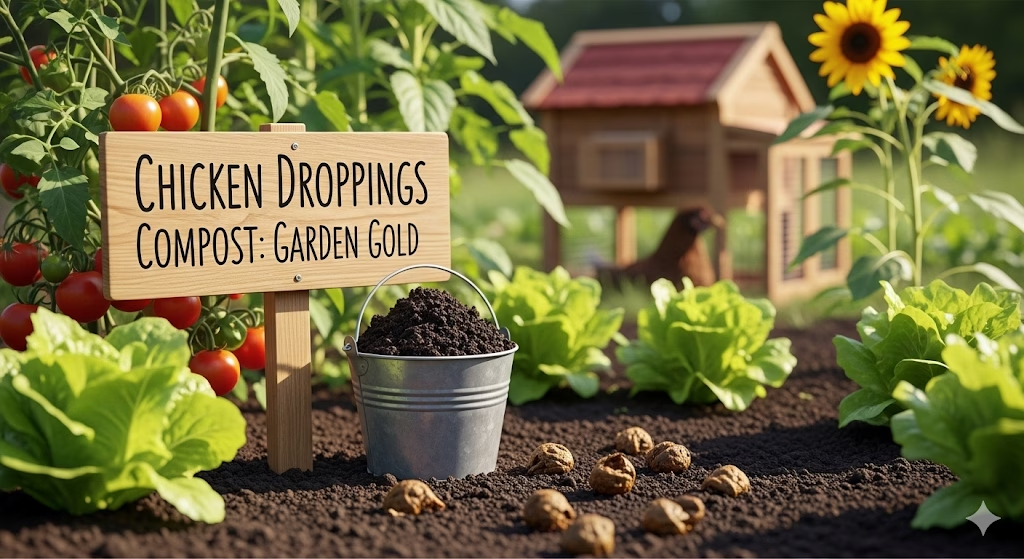Introduction
Gardeners have always looked for natural ways to enrich their soil, and one of the most effective options is chicken droppings compost. Rich in nitrogen and other nutrients, chicken manure has been used for centuries as an organic fertilizer. But there’s a catch: fresh chicken poop can actually harm plants if applied directly.

That’s where composting chicken manure comes in. Properly composted, it transforms into a nutrient-rich, safe, and sustainable soil amendment. In this article, we’ll explore the benefits, step-by-step composting methods, potential risks, and best practices for using chicken droppings compost in your garden.
What Is Chicken Droppings Compost?
Chicken droppings compost—often called chicken manure compost—is the product of composting chicken poop along with bedding materials such as straw, sawdust, or wood shavings.
Fresh chicken manure is considered a “hot” manure because it contains very high nitrogen levels. Applying it directly to soil can “burn” plants. By composting, nitrogen levels are stabilized, pathogens are reduced, and nutrients are made more plant-available.
Nutrient Profile of Chicken Manure
According to the USDA and Washington State University Extension, chicken manure is one of the most nutrient-rich animal manures available.
On average, composted chicken manure contains:
- Nitrogen (N): 3–4%
- Phosphorus (P): 2–3%
- Potassium (K): 1–2%
- Calcium, magnesium, and micronutrients in smaller amounts
This makes chicken droppings compost a complete, slow-release fertilizer suitable for many crops.
Why Compost Chicken Droppings?
1. Neutralizes Excess Nitrogen
Fresh droppings are so strong they can damage roots. Composting balances nutrients and makes them safer.
2. Kills Pathogens and Weed Seeds
The high heat generated during composting reduces harmful bacteria like E. coli and Salmonella.
3. Improves Soil Structure
The addition of organic matter helps soil retain moisture, improves aeration, and boosts microbial activity.
4. Reduces Odor
Fresh chicken poop has a strong smell. Composting breaks it down into a more earthy scent.
5. Sustainable and Free
For backyard chicken keepers, it’s an eco-friendly way to recycle waste into valuable fertilizer.
Is Chicken Manure Good for Gardens?
Yes, chicken manure compost is excellent for gardens, but only after it has been properly composted.
Benefits for Plants and Soil
- Boosts vegetable growth: Especially leafy greens like spinach, lettuce, and kale.
- Encourages flowering and fruiting: Tomatoes, peppers, and cucumbers thrive.
- Feeds soil microbes: Creates a healthier soil ecosystem.
- Increases yields naturally: Studies show poultry manure can outperform synthetic fertilizers when applied correctly.
For more soil-building options, see our guide on Best Compost for Vegetable Gardens.
How to Compost Chicken Droppings
Here’s a step-by-step guide to safely composting chicken manure:
Step 1: Collect Materials
- Fresh chicken droppings
- Carbon-rich bedding (straw, wood shavings, dry leaves, sawdust)
- Optional: kitchen scraps or grass clippings
Step 2: Balance Carbon and Nitrogen
Chicken manure is nitrogen-rich (“green”), so you must balance it with carbon-rich (“brown”) materials.
- Ratio: 1 part chicken manure to 2 parts bedding materials
Step 3: Build Your Pile
- Layer droppings and bedding in a compost bin or pile.
- Aim for a pile size of at least 3x3x3 feet for effective heating.
Step 4: Maintain Heat
- Monitor temperature with a compost thermometer.
- Ideal range: 130–150°F (55–65°C) to kill pathogens.
Step 5: Turn the Pile
- Aerate every 1–2 weeks to keep oxygen flowing.
- Add water if too dry; cover if too wet.
Step 6: Curing
- Allow compost to mature for 6–9 months before use.
- Finished compost will be dark, crumbly, and earthy-smelling.
Chicken Droppings Compost vs Fresh Manure
| Feature | Fresh Chicken Manure | Chicken Droppings Compost |
|---|---|---|
| Nutrient Level | Very high nitrogen, risk of burning | Balanced, slow-release |
| Pathogens | May contain harmful bacteria | Pathogens reduced by heat |
| Odor | Strong and unpleasant | Earthy smell |
| Safety for Plants | Unsafe without aging | Safe for immediate use |
How to Use Chicken Droppings Compost
1. In Vegetable Gardens
- Apply ½–1 inch layer over soil and mix into the top 6–8 inches.
- Works especially well for leafy greens and fruiting crops.
2. As Mulch
- Spread a thin layer around established plants to suppress weeds and add nutrients.
3. In Lawns
- Top-dress with a light layer of sifted chicken compost to encourage lush, green grass.
4. For Fruit Trees and Shrubs
- Apply in spring or early fall around the drip line (avoid direct contact with trunk).
5. In Compost Teas
- Brew a diluted compost tea for a nutrient-rich liquid feed.
Plants That Benefit Most
- Lettuce, spinach, kale
- Tomatoes and peppers
- Cucumbers and squash
- Root crops like carrots and beets
Plants to Be Careful With
Because chicken compost is nitrogen-heavy, avoid over-application near:
- Potatoes (too much nitrogen delays tuber formation)
- Legumes (beans, peas) since they fix their own nitrogen
Safety Tips for Using Chicken Droppings Compost
- Always compost before use – Never apply fresh manure.
- Wash vegetables well – Especially root crops and leafy greens.
- Wear gloves when handling – Reduces risk of pathogen exposure.
- Store properly – Keep piles covered and away from waterways.
Chicken Droppings Compost vs Other Animal Manures
| Type | Nutrient Level | Advantages | Considerations |
|---|---|---|---|
| Chicken | Very high NPK | Fast growth, composts quickly | Must be composted first |
| Cow | Lower nutrients | Gentle, safe | Bulky, less concentrated |
| Horse | Moderate nutrients | Improves soil texture | May contain weed seeds |
| Sheep/Goat | Balanced nutrients | Dry and easy to handle | Less available in bulk |
Where to Get Chicken Manure
- Backyard flocks – Perfect for small-scale gardeners.
- Local farms – Many sell aged or composted chicken manure.
- Garden centers – Bagged and pre-composted products.
See our full guide on Organic Gardening Tips for more eco-friendly solutions.
Conclusion
So, is chicken manure good for gardens? The answer is a resounding yes—if it’s composted first. Chicken droppings compost provides one of the richest natural fertilizers available, improving soil fertility, boosting plant growth, and reducing reliance on chemical fertilizers.
By following safe composting practices and applying it in moderation, gardeners can transform poultry waste into a valuable resource for healthy, productive gardens.
Call to Action: Want to learn more about organic fertilizers and composting methods? Visit Agzora.com for expert soil guides, eco-gardening tools, and sustainable gardening solutions.
FAQs on Chicken Droppings Compost
1. Can I use chicken manure without composting?
No, you should not apply fresh chicken manure directly to plants. It is very high in nitrogen and can burn roots. Composting also helps kill harmful bacteria, making it safe for use in gardens.
2. How long should chicken manure be composted?
Chicken manure typically needs 6–9 months of composting before it is safe for garden use. Proper composting ensures the material is stable, nutrient-balanced, and free of pathogens.
3. Is chicken manure better than cow manure?
Chicken manure is richer in nutrients, especially nitrogen, phosphorus, and potassium. Cow manure is gentler and less concentrated, making it safer to apply fresh but less effective as a strong fertilizer.
4. Can chicken droppings compost be used for all plants?
It’s excellent for vegetables, lawns, and fruiting plants, but should be used in moderation around crops that don’t need high nitrogen, like beans or potatoes, and avoided near acid-loving plants without pH adjustments.
5. Does chicken manure compost smell bad?
When fresh, chicken manure smells strong, but after proper composting, it develops a mild, earthy scent similar to other organic composts.





